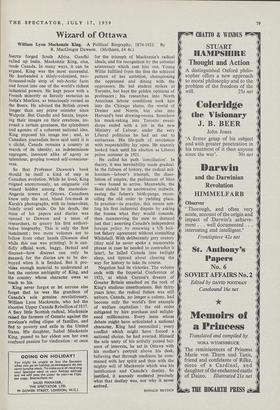Wizard of Ottawa
William Lyon Mackenzie King. A Political Biography, 1874-1923. By R. MacGregor Dawson. (Methuen, £4 4s.) SMUTS forged South Africa. Gandhi called up India. Mackenzie King, alas, made Canada. In many ways, it can be argued, King was the most successful. He husbanded a thinly-colonised, two- thousand-mile strip of sub-Arctic farm and forest into one of the world's richest industrial powers. He kept peace with a French minority as fiercely sectarian as India's Muslims, as tenaciously rooted as the Boers. He advised the British crown longer than any prime minister since Walpole. But Gandhi and Smuts, impos- ing their images on their creations, im- posed a certain greatness, the splendours and agonies of a coherent national idea. King imposed his image too ; and, as Canadian journalists have said until it is a cliché, Canada remains a country in search of its identity, an indeterminate aggregate, innocent alike of agony or splendour, groping toward self-conscious- ness.
So that Professor Dawson's book should be itself a kind of step in Canadian evolution. While he lived, King reigned anonymously, an enigmatic old wizard hidden among the mastodon- Angevin towers of Ottawa. Canadians knew only the neat, bland fox-mask in Karsh's photographs, with its benevolent, faintly cruel smile. On his death, the mass of his papers and diaries was opened to Dawson and a team of researchers, to quarry his first authori- tative biography. This is only the first instalment ; two more volumes are to follow from other hands (Dawson died while this one was printing). It is can- didly official work, baggy, factual and discreet—how discreet can only be guessed, for the diaries are to be des- troyed when it is finished. But it pro- vides enough material to understand at last the curious ambiguity of King, and the country whose character owes so much to his.
King never forgot or let anyone else forget that he was the grandson of Canada's sole genuine revolutionary, William Lyon Mackenzie, who led the abortive Upper Canada Rebellion of 1837. A fiery little Scottish radical, Mackenzie raised the farmers of Ontario against the province's ruling clique of families, and fled to poverty and exile in the United States. His daughter, Isabel Mackenzie King, passed to her eldest son her own confused passion for vindication : at once for the triumph of Mackenzie's radical ideals, and for recognition by the colonial aristocracy which cast him out. Young Willie fulfilled from the first the schizoid pattern of her ambition, championing the oppressed and dining with the oppressors. He led student strikes at Toronto, but kept the golden opinions of professors ; his researches into North American labour conditions took him into the Chicago slums, the world of Dreiser and Norris, but also into Harvard's best drawing-rooms. Somehow his muck-raking into Toronto sweat- shops ended with a job in the new Ministry of Labour, under the very Liberal politician he had set out to embarrass. His life-path of revolution with respectability lay open. He scarcely looked back until his election as Liberal prime minister in 1921.
He called his path 'conciliation'. In theory, it was inevitability made gradual. In the fulness of history, the radical mil- lennium—labour's triumph, the disso- lution of empire, the parliament of Man —was bound to arrive. Meanwhile, the State should be its unobtrusive midwife, easing the future's birth-pangs, recon- ciling the old order to yielding place. In practice—in practice, this means sett- ling his first industrial dispute by asking the bosses what they would concede, then manoeuvring the men to demand just that ; asserting Canada's independent foreign policy by renewing a US hali- but fishery agreement without consulting Whitehall. With deliberately grey oratory (they said he never spoke a memorable phrase in case he needed to contradict it later), he lulled Canada into twilight sleep, and tiptoed about clearing the way for history to take its course.
Negation had its victories. The volume ends with the Imperial Conference of 1923, at which Curzon's dreams of Greater Britain smashed on the rock of King's studious unonthusiasm. But thirty years later, the radical future was still unborn. Canada, no longer a colony, had become only the world's first example of welfare capitalism : the old order mitigated by hire purchase and enlight- ened millionaires. Every issue whose debate might have articulated a national character, King had reconciled ; every conflict which might have forced a national choice, he had averted. Himself the sole unity of his artfully poised bal- ance of interests, he sat in Ottawa with his mother's portrait above his desk, believing that through mediums he com- muned with her spirit and thus with the mighty will of Mackenzie which was his justification and Canada's destiny. So justified, it scarcely mattered precisely what that destiny was, nor why it never arrived.
RONALD BRYDEN






































 Previous page
Previous page